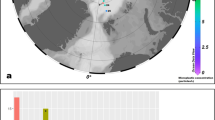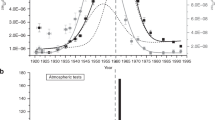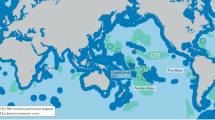Abstract
Ruthenium, one of the rarest metals of the platinum group, has not previously been investigated in ocean waters and sediments because of its low concentration therein and the lack of sensitive analytical methods. However, the study of ruthenium distribution in the ocean is of interest not only in oceanology but also in geology, geochemistry and cosmochemistry, as it may help in understanding the lithosphere formation processes. We report here the results of ruthenium trace determination in various oceanic environments carried out using a combination of methods including fire assay enrichment and laser photoionization spectroscopy in conjunction with vacuum atomization1. The ruthenium content in the marine environment fluctuates in the range covering 4–5 orders of magnitude: ∼1 p.p.t. (parts per 1012) in marine water, tens of p.p.t. in marine biogenic material, 10–100 p.p.t. in bottom sediments and marine phosphorites, and >1,000 p.p.t. in ferromanganese nodules and the Red Sea metalliferous sediments.
This is a preview of subscription content, access via your institution
Access options
Subscribe to this journal
Receive 51 print issues and online access
$199.00 per year
only $3.90 per issue
Buy this article
- Purchase on Springer Link
- Instant access to full article PDF
Prices may be subject to local taxes which are calculated during checkout
Similar content being viewed by others
References
Bekov, G. I. & Letokhov, V. S. Appl. Phys. B30, 161–176 (1983).
Reevs, R. D. & Brooks, R. R. Trace Element Analysis of Geological Materials (Wiley, New York, 1978).
Jäger, H. Appl. Atom. Spectrosc. 2, 1–51 (1978).
Khvostova, V. P., Golovnya, S. V. Zavod Lab. (Russian) 48, 3–7 (1982).
Kolosova, L. P. Zavod. Lab. (Russian) 48, 8–12 (1982).
Haffty, J., Riley, L. B. & Goss, W. D. Bull. geol. Surv. No. 1445 (1977).
Bekov, G. I., Yegorov, A. S., Letokhov, V. S. & Radaev, V. N. Nature 301, 410–412 (1983).
Hendricks, L. R., Reisbock, R. F., Mahaffey, E. J., Roberts, D. B. & Peterson, M. N. A. in Hot Brines and Recent Heavy Metal Deposits in the Red Sea (eds Degens, E. T. & Ross, D. A.) (Springer, New York, 1965).
Mero, J. L. The Mineral Resources of the Sea (Eisevier, Amsterdam, 1965).
Flanagan, F. J. & Gottfried, D. U.S. geol. Surv. Prof. Pap. No. 1155, (1980).
Yushko-Zakharova, O. E. Platinum-bearing Ore Deposits (Russian) (Nedra, Moscow, 1975).
Baturin, G. N. Phosphorites on the Sea Moor (Elsevier, Amsterdam, 1982).
Popov, N. I., Fedorov, K. N. & Orlov, V. M. Seawater (Russian) (Nauka, Moscow, 1979).
Lee, D. S. Nature 305, 47–48 (1983).
Bruland, K. W. in Chemical Oceanography Vol. 8, 157–225 (Academic, New York, 1969).
Crocket, H. Geochim. cosmochim. Acta 36, 517 (1972).
Wedepohl, K. H. Int. Ser. Monogr. Earth Sci. 30, 999–1016 (1968).
Pettersson, H. & Rotschi, H. Geochim. cosmochim. Acta 2, 81 (1952).
Agiorgitis, G. & Gundlach, H. Naturwissenschaften 65, 534 (1978).
Author information
Authors and Affiliations
Rights and permissions
About this article
Cite this article
Bekov, G., Letokhov, V., Radaev, V. et al. Ruthenium in the ocean. Nature 312, 748–750 (1984). https://doi.org/10.1038/312748a0
Received:
Accepted:
Issue Date:
DOI: https://doi.org/10.1038/312748a0
Comments
By submitting a comment you agree to abide by our Terms and Community Guidelines. If you find something abusive or that does not comply with our terms or guidelines please flag it as inappropriate.



